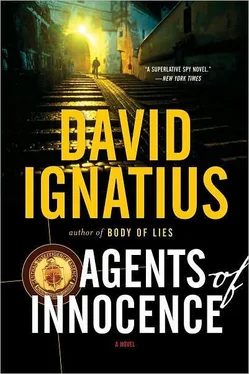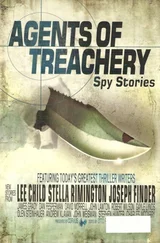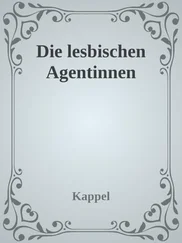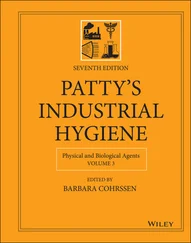David Ignatius - Agents of Innocence
Здесь есть возможность читать онлайн «David Ignatius - Agents of Innocence» весь текст электронной книги совершенно бесплатно (целиком полную версию без сокращений). В некоторых случаях можно слушать аудио, скачать через торрент в формате fb2 и присутствует краткое содержание. Жанр: Шпионский детектив, на английском языке. Описание произведения, (предисловие) а так же отзывы посетителей доступны на портале библиотеки ЛибКат.
- Название:Agents of Innocence
- Автор:
- Жанр:
- Год:неизвестен
- ISBN:нет данных
- Рейтинг книги:3 / 5. Голосов: 1
-
Избранное:Добавить в избранное
- Отзывы:
-
Ваша оценка:
- 60
- 1
- 2
- 3
- 4
- 5
Agents of Innocence: краткое содержание, описание и аннотация
Предлагаем к чтению аннотацию, описание, краткое содержание или предисловие (зависит от того, что написал сам автор книги «Agents of Innocence»). Если вы не нашли необходимую информацию о книге — напишите в комментариях, мы постараемся отыскать её.
Agents of Innocence — читать онлайн бесплатно полную книгу (весь текст) целиком
Ниже представлен текст книги, разбитый по страницам. Система сохранения места последней прочитанной страницы, позволяет с удобством читать онлайн бесплатно книгу «Agents of Innocence», без необходимости каждый раз заново искать на чём Вы остановились. Поставьте закладку, и сможете в любой момент перейти на страницу, на которой закончили чтение.
Интервал:
Закладка:
“Yes, to be sure,” said Father Maroun. The answer apparently was not exactly what he had wanted. The priest had taken off his Tyrolean hat, and Rogers could see that his brow was covered with sweat.
The Lebanese priest lit another cigarette, swallowed hard, and continued.
“What do you think of Jamal Ramlawi?”
Rogers didn’t miss a beat. There wasn’t a twitch of the nostrils or a movement of the eyes out of the ordinary.
“My impression is that Ramlawi is bright and capable, but I don’t know much about him,” he answered evenly. “What’s your impression?”
“Me?” asked the priest. “Oh my goodness. I don’t really know. I don’t know too much about him myself.”
“Then why do you ask?” queried Rogers.
The priest was looking more and more uncomfortable. Looking at Father Maroun, sweating in his leather pants and kneesocks, Rogers had an odd thought: Is it possible that the padre is wearing a wire?
“I was just wondering,” said the priest, “whether this man Ramlawi is perhaps someone we could, I mean, possibly in the future, quietly of course, with complete discretion on our side, perhaps…”
“What?” asked Rogers.
“Talk to,” said the priest. “About the situation in Lebanon.”
“I have no idea,” said Rogers. “Why don’t you ask him yourself?”
“That is so awkward. You know how Lebanon is. We cannot talk with other Lebanese, let alone with Palestinians. We need a mediator. An interlocutor.”
“Sorry, Father, but we can’t help on that one. We only know one side in the transaction. Which is you.”
“I see,” said Father Maroun.
“Perhaps,” said Rogers, feeling slightly peeved and malicious, “your Israeli friends can help.”
The priest looked for a moment as if he might fall off his walking stick.
“I beg your pardon?”
“Just a thought,” said Rogers. “If you ever meet any Israelis, you might pose the question to them. I gather they have awfully good contacts with some of the Palestinians.”
“They do? ” asked Father Maroun, his eyes widening.
“I believe so,” said Rogers. “Perhaps they can help you.”
“Jesus, Mary, and Joseph!” The priest shook his head. He had the look of a man who has heard, for the first time, a suggestion that his sweetheart may be two-timing him. He looked pale. His expression had gone from the nervousness of a few minutes ago to one of shock.
Rogers felt sorry for him. But not sorry enough to do anything about it.
“Perhaps we should be heading back,” he suggested.
“Yes,” said the priest with relief. “Let us go back at once.”
They walked down the rocky slope in silence. Rogers turned the strange conversation over in his mind. If the Israelis had sent Father Maroun on this fishing expedition, it was an unusually sloppy operation. Perhaps it was simply their way of putting the agency on notice, firing a warning shot at the Beirut station. Or perhaps, thought Rogers, it was not an Israeli gambit at all. Perhaps Father Maroun was completely genuine. He was a religious man, who cared deeply about his country. Perhaps he truly wanted to establish a quiet channel of contact between the Maronite Church and the fedayeen. If so, Jamal Ramlawi was an obvious candidate. Sophisticated, close to the Old Man. Perhaps Father Maroun’s nervousness was simply the discomfort that any outsider would feel wandering into the secret world without knowing the rules. Perhaps his naivete was the clearest sign that his intentions were pure.
Either way, Rogers concluded, it was probably best to assume that the Israelis would hear about the conversation. He would let Hoffman, who was edgy about anything involving liaison with Mossad, file the cable back to Langley about the unlikely overture from the Maronite cleric.
When Rogers returned to the office that day, he had another odd communication. There was a note waiting for him from Solange Jezzine. It was written on cream-colored stationery, so firm and heavy that it seemed to have been starched, and it smelled faintly of perfume. A red ribbon was tied in a bow at the top of the notepaper, like a red garter atop a pair of silk stockings.
The note itself was as provocative as the package. Solange invited Rogers to come pay a visit, alone.
Rogers sighed and shook his head. What an extraordinary woman! He penned a brief note saying no, thank you. I’m awfully busy just now. The worst thing about work, Rogers wrote, was that it left too little time for play. Perhaps another time. When he walked out of his office that afternoon, Rogers thought he saw his secretary, who had brought the Jezzine letter up from the front desk, smiling at him as if they shared a secret.
The Fatah campaign of terror began in Cairo on November 28, 1971, when a team of four Palestinians murdered the Jordanian prime minister. They shot him in broad daylight, in front of a crowd of other dignitaries, as he was entering the lobby of the Cairo Sheraton. Witnesses said that one of the gunmen kneeled over the body of the dying Jordanian official and licked his blood. The assassins were immediately captured by Egyptian police. They said they were members of a previously unknown organization called Black September, which took its name from the expulsion of the PLO from
Jordan in September 1970.
The next target was the Jordanian Ambassador to London. As the Jordanian official neared his office one day in December, a gunman standing on a traffic island shot at his Daimler limousine with a submachine gun. The ambassador survived. The gunman, an Algerian, escaped. The Jordanians attributed the operation to the same network that had murdered their prime minister. Fatah spokesmen denied responsibility and blamed Black September. Investigators rushed to gather evidence about this new terrorist faction, but they came up with nothing but rumors. The group was frighteningly discreet. It was like an animal that left no tracks.
A few months later, the bombs began to explode in Beirut. They weren’t large devices; often they were little more than sticks of dynamite, meant to confuse and demoralize the Lebanese. Beirutis blamed their favorite villain-Palestinian, Syrian, or Israeli-depending on their political perspective. The painful truth was that nobody really knew who was responsible. It was the year of the bombs.
Black September soon struck again in Europe. This time they attacked targets linked to Israel. Israeli-owned oil facilities in Rotterdam and Hamburg. An electronics plant in West Germany that did extensive business with Israel. They also executed five suspected members of the Jordanian Moukhabarat. The terrorists were becoming heroes in the Arab world, spawning a series of copycat operations. There was jealousy within Fatah, as various lieutenants tried to develop their own terrorist networks.
The Israelis soon escalated their attacks against Fatah. After a fedayeen raid inside Israel, the Israeli Army invaded South Lebanon. The Israelis stayed for four days. Officials in Jerusalem claimed they had struck a decisive blow at the guerrillas. The Israeli operation exacerbated the Lebanese political crisis, as poor refugees from South Lebanon-mostly Shiite Moslems-streamed into the slums outside Beirut. The Lebanese pleaded for decisive action, which their corrupt and paralyzed government couldn’t provide.
Black September continued its campaign of revenge. The group attacked a Jordanian airlines office in Rome, a Jordanian airplane in Cairo, the Jordanian Embassy in Berne, the Jordanian Embassy in Cairo. The group also staged a spectacular but ultimately disastrous operation against Israel. Members of Black September hijacked a Sabena Airlines flight to Tel Aviv and held the passengers hostage at Lod Airport. Israeli commandos, disguised as mechanics, stormed the plane and killed two of the four hijackers.
Читать дальшеИнтервал:
Закладка:
Похожие книги на «Agents of Innocence»
Представляем Вашему вниманию похожие книги на «Agents of Innocence» списком для выбора. Мы отобрали схожую по названию и смыслу литературу в надежде предоставить читателям больше вариантов отыскать новые, интересные, ещё непрочитанные произведения.
Обсуждение, отзывы о книге «Agents of Innocence» и просто собственные мнения читателей. Оставьте ваши комментарии, напишите, что Вы думаете о произведении, его смысле или главных героях. Укажите что конкретно понравилось, а что нет, и почему Вы так считаете.












